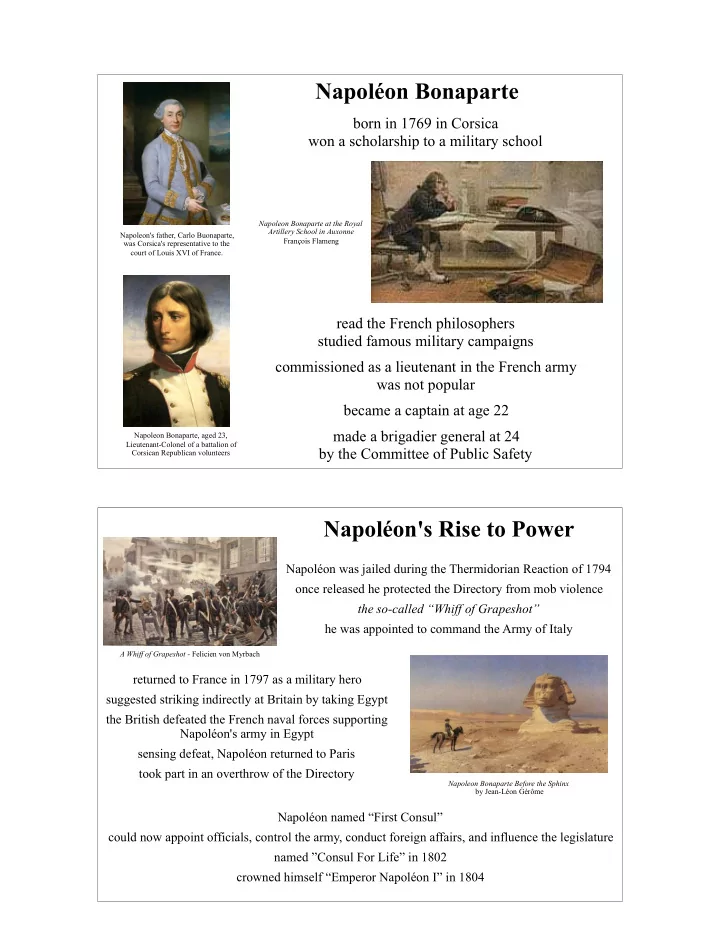

Napoléon Bonaparte born in 1769 in Corsica won a scholarship to a military school Napoleon Bonaparte at the Royal Artillery School in Auxonne Napoleon's father, Carlo Buonaparte, François Flameng was Corsica's representative to the court of Louis XVI of France. read the French philosophers studied famous military campaigns commissioned as a lieutenant in the French army was not popular became a captain at age 22 made a brigadier general at 24 Napoleon Bonaparte, aged 23, Lieutenant-Colonel of a battalion of by the Committee of Public Safety Corsican Republican volunteers Napoléon's Rise to Power Napoléon was jailed during the Thermidorian Reaction of 1794 once released he protected the Directory from mob violence the so-called “Whiff of Grapeshot” he was appointed to command the Army of Italy A Whiff of Grapeshot - Felicien von Myrbach returned to France in 1797 as a military hero suggested striking indirectly at Britain by taking Egypt the British defeated the French naval forces supporting Napoléon's army in Egypt sensing defeat, Napoléon returned to Paris took part in an overthrow of the Directory Napoleon Bonaparte Before the Sphinx by Jean-Léon Gérôme Napoléon named “First Consul” could now appoint officials, control the army, conduct foreign affairs, and influence the legislature named ”Consul For Life” in 1802 crowned himself “Emperor Napoléon I” in 1804
Napoléon’s Domestic Policies Religion: Catholicism was recognized as the majority religion the pope agreed that church lands seized in the revolution would not have to be returned Education: placed the French educational system under the control of the federal government created lycees, universities, and technical schools. Economy: created the Bank of France Bonaparte, First Consul by Jean Auguste Dominique required every French citizen to pay taxes Ingres created the Continental System: forbid British goods from reaching the European continent Laws: condensed the almost 300 different French legal systems into seven law codes called the Civil Code, or Napoléonic Code (1804) preserved equality of all citizens ( except women ) Napoleon Crossing the Alps the right of the individual to choose a profession, by Jacques-Louis David, 1805 religious toleration, abolition of serfdom Napoléon’s Continental System Napoléon’s attempt to stop British goods from reaching the European continent failed: Allied states resented having their trade regulated by Napoléon "Who shaved as well as any Man, almost not quite” September 1806 Napoleon is the barber who shaves the powers of Europe in his shop. John Bull (England) looks in through a window. A bill on the wall: 'Nap. Boney shaver general to most of the Sovereigns on the Continet [sic] - shaves expeditiously and clean a few Gashes excepted, is ready to undertake any new Customer who is willing to submit to the above.’
The Fall of Napoléon rise of European nationalism: countries conquered by Napoléon united in their hatred of Napoléon Napoléon’s army entered Russia in June 1812: wanted to punish them for ignoring the Continental System Russians retreated for hundreds of miles, burning their own villages to keep Napoléon's army from finding food Moscow was ablaze when Napoléon’s Grand Army arrived in late October Napoléon led the “Great Retreat” French soldiers starved and froze along the way fewer than 40,000 of the 600,000 soldiers survived Napoleon's withdrawal from Russia by Adolph Northen The Moscow Fire unknown German artist other European states rose up against the crippled French army and captured Paris in March 1814 Napoléon exiled to the island of Elba Louis XVIII restored to the monarchy of France The Return (and defeat) of Napoléon Napoléon left Elba and slipped back into France opened his coat and told the troops sent to capture him: “Soldiers of the 5th regiment … if there is a man among you [who] would kill his Emperor, here I am!” Shouting ”Long live the Emperor!” the troops took his side. On March 20, 1815, Napoléon entered Paris in triumph. Napoleon returned from Elba, by Karl Stenben devoted veterans rallied from all over France to raise an army for Napoléon June 18, 1815, Battle of Waterloo (Belgium) Napoléon met a combined British and Prussian army suffered a bloody defeat exiled to island of St. Helena remained in exile there until his death in 1821
Recommend
More recommend